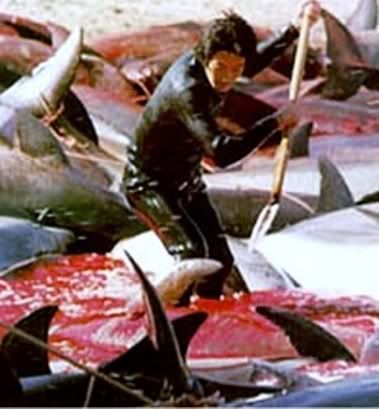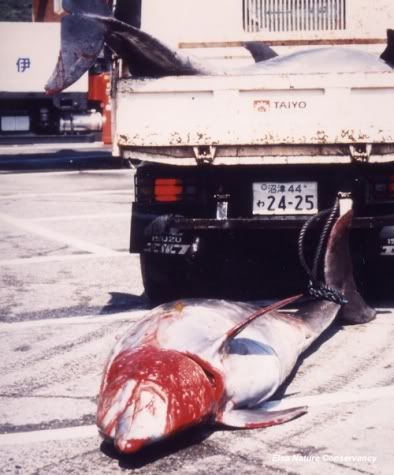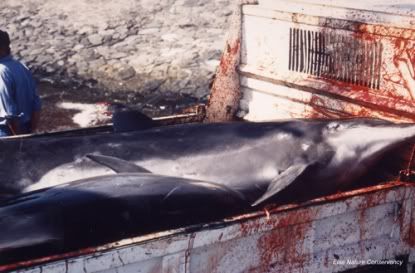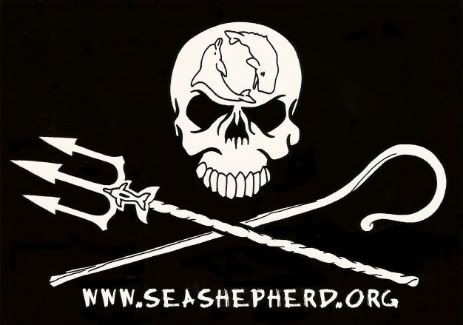
Dolphin Slaughter in Japan.
In Japan, fishermen round up and slaughter thousands of dolphins and other small whales each year.
In the small fishing village of Taiji, entire schools of dolphins are driven into a hidden cove after a prolonged chase. Once trapped inside the cove, the fishermen kill the dolphins, slashing their throats with knives or stabbing them with spears. The water turns red with their blood, and the air fills with their screams.
This brutal massacre — the largest scale dolphin kill in the world — goes on for six months of every year. Even more scandalous, members of the international dolphin display industry take advantage of the dolphin slaughter to obtain some few, show-quality dolphins for use in captive dolphin shows and dolphin swim programs.
Facts about the Dolphin Slaughter.
About 23,000 dolphins, porpoises and other small whales are killed in Japan every year, making it the largest scale slaughter of cetaceans in the world.
• About 2,500 dolphins and other small whales are killed in the so-called dolphin drive hunt that takes place six months out of the year.The rest are killed with handheld harpoons out at sea.
• In the small fishing village of Taiji, Wakayama prefecture, the dolphin drive hunt is carried out by about 26 fishermen from September 1st though March.
• Operating with 13 motorized boats, the fishermen go out to sea at early sunrise and look for migrating dolphins. Banging on metal pipes submerged into the water, they terrorize the dolphins with a "wall of sound," causing the dolphins to panic.
• Terrorizing the dolphins with underwater sound, the fishermen herd the dolphins into a secret killing cove close to Taiji Town.
• Often times, dolphins die during the chase that can last eight hours or more.
• The Taiji fishermen claim that dolphins eat too much fish and therefore must be exterminated.
• Operating with a permit from their government, the Taiji fishermen have referred to the dolphin hunt as "pest control."
• The majority of people in Japan have no knowledge about the annual dolphin blood bath.
• The fishermen kill the dolphins with spears, fishermen's hooks and knives. Trashing about in their own blood, the dolphins emit high-pitched screams during the massacre.
• The slaughtered dolphins are processed into meat and distributed to supermarkets throughout Japan for human consumption.
• Dolphin meat from drive hunts in Taiji proved to be highly contaminated with toxic chemicals such as mercury, methyl mercury and PCBs.
• Repeated chemical analyses have shown that the level of mercury in dolphin meat is much higher than the maximum allowable level set by the Ministry of Health, Labor and Welfare of Japan.
• Some of the dolphin meat is given to children as part of their school lunch program.
• The Japanese government and the supermarkets issue no warning that dolphin meat is mercury-contaminated.
• The fishermen of Taiji have told us that the Japanese people have no right to know about the dolphin hunt or the high levels of mercury found in the meat.
• Concealing this information from the public is a violation of Article 21 of the Japanese Constitution.
• Some members of the international aquarium and zoo industry are strongly connected to the Japanese dolphin slaughter, in that they pay top dollar for dolphins deemed suitable for commercial exploitation in dolphin shows and captive dolphin swim programs.
• Dolphinariums throughout the world, including Japan, repeatedly make the claim that captivity of dolphins promotes dolphin conservation and protection.
• Several of the hundreds of captive dolphins in Japan's 50 dolphinariums were obtained through the dolphin drive hunts; yet the dolphinariums do nothing to educate the public to the hunt.
• The World Association for Zoos and Aquariums (WAZA) is the world's largest network of zoos and aquariums around the world.
• Dolphinariums that have conducted business with the dolphin killers of Japan have been welcomed into WAZA's network, although the trade in these dolphins clearly violates WAZA's Code of Ethics.
• The dolphins that are purchased by members of the dolphin captivity industry represent a much higher commercial value to the Japanese dolphin hunters than the ones that are slaughtered for meat.
• Live dolphins captured in a Taiji dolphin drive hunt recently sold for $154,000 per dolphin.
• The Japanese dolphin hunt will continue for as long as members of the international dolphinarium industry continue to reward the hunters for show quality dolphins, thereby making the hunt tremendously profitable.
• The most sought after dolphin species for public display are bottlenose dolphins, orcas, white sided dolphins, Risso's dolphins, pilot whales and Pseudo orcas, all of which have been targeted in the Japanese dolphin drive hunt.
How You Can Help.

Click here to sign the petition to end Dolphin Slaughter in Japan
Please send a message to the Japanese Embassy, asking to stop the dolphin drive hunt and prohibit the sale of mercury-contaminated dolphin meat:
Embassy of Japan in Washington D.C.
Ambassador Ichiro Fujisaki
2520 Massachusetts Ave., N.W.
Washington D.C. 20008-2869
Tel: (202) 238-6700,
Fax: 202-328-2187
Hours: M-F 9:15-12:30 and 2:00-6:16
E-mail: jicc@embjapan.org
Web: http://www.mofa.go.jp/about/emb_cons/mofaserv.html
For more information on dolphin drive hunts, contact addreses and to see how you can help, please go to the websites below.

www. seashepherd. org

www. bluevoice. org
Please Repost, thanks.
Note To My Critics:
The links to the many sites that I've included contain information that I believe to be relevant, be it the graphics, the videos, the undercover investigations, etc. . Exposing & and ending the brutality and savagery inflicted on the non-human animals is what I am focused on. I strongly believe that every voice against animal abuse/exploitation is of value and -and- collectively we have the power to end it. I am here for the animals, not for anyone's approval and for that I make no apologies. ** I do not promote violence towards humans.
___________________________________________________

Friday, May 15, 2009
Dolphin Slaughter In Japan
Subscribe to:
Post Comments (Atom)














2 Comments:
Your article is gold, i love it.
i am indeed horrified of what's happening with the dolphins it needs to be stopped.
its horrible and so sad! what did those poor dolphins ever do to the people killing them????
Post a Comment